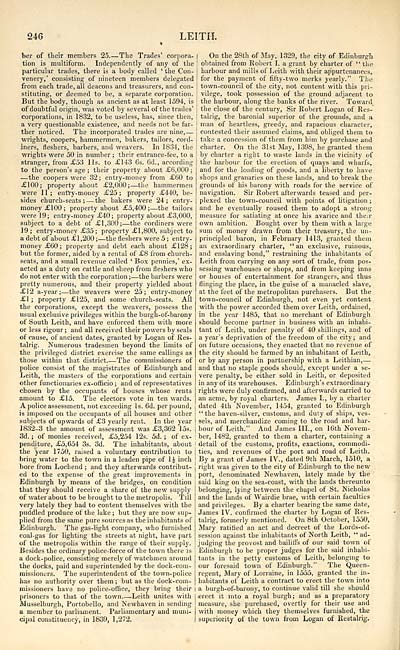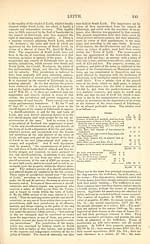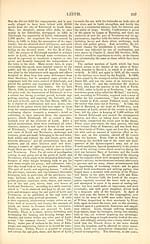Topographical, statistical, and historical gazetteer of Scotland > Volume 2
(258) Page 246
Download files
Complete book:
Individual page:
Thumbnail gallery: Grid view | List view

246
LEITH.
ber of their members 25. — The Trades' corpora-
tion is multiform. Independently of any of the
particular trades, there is a body called ' the Con-
venery,' consisting of nineteen members delegated
from each trade, all deacons and treasurers, and con-
stituting, or deemed to be, a separate corporation.
But the body, though as ancient as at least 1594, is
of doubtful origin, was voted by several of the trades'
corporations, in 1832, to be useless, has, since then,
a very questionable existence, and needs not be far-
ther noticed. The incorporated trades are nine, —
wrights, coopers, hammermen, bakers, tailors, cord-
iners, fleshers, barbers, and weavers. In 1834, the
wrights were 50 in number ; their entrance-fee, to a
stranger, from £53 lis. to £143 6s. 6d., according
to the person's age ; their property about £6,000 ;
— the coopers were 32; entry-money from £60 to
£100; property about £2,000; — the hammermen
were 1 1 ; entry-money £25 ; property £440, be-
sides church-seats; — the bakers were 24; entry-
money £100; property about £5,400; — the tailors
were 19; entry-money £40 ; property about £3,000,
subject to a debt of £1,300; — the cordiners were
19; entry-money £35 ; property £1,800, subject to
a debt of about £l, 200; — the fleshers were 5; entry-
money £60; property and debt each about £128;
but the former, aided by a rental of £8 from church-
seats, and a small revenue called ' Box pennies,' ex-
acted as a duty on cattle and sheep from fleshers who
do not enter with the corporation ; — the barbers were
pretty numerous, and their property yielded about
£12 a-year; — the weavers were 25; entry-money
£1 ; property £125, and some church-seats. All
the corporations, except the weavers, possess the
usual exclusive privileges within the burgh-of-barony
of South Leith, and have enforced them with more
or less rigour ; and all received their powers by seals
of cause, of ancient dates, granted by Logan of Res-
talrig. Numerous tradesmen beyond the limits of
the privileged district exercise the same callings as
those within that district. — The commissioners of
police consist of the magistrates of Edinburgh and
Leith, the masters of the corporations and certain
other functionaries ex-officio ; and of representatives
chosen by the occupants of houses whose rents
amount to £15. The electors vote in ten wards.
A police assessment, not exceeding Is. 6d. per pound,
is imposed on the occupants of all houses and other
subjects of upwards of £3 yearly rent. In the year
1832-3 the amount of assessment was £3,362 15s.
3d. ; of monies received, £5,254 12s. 5d. ; of ex-
penditure, £5,654 3s. 3d. The inhabitants, about
the year 1750, raised a voluntary contribution to
bring water to the town in a leaden pipe of li inch
bore from Lochend ; and they afterwards contribut-
ed to the expense of the great improvements in
Edinburgh by means of the bridges, on condition
that they should receive a share of the new supply
of water about to be brought to the metropolis. Till
very lately they had to content themselves with the
puddled produce of the lake ; but they are now sup-
plied from the same pure sources as the inhabitants of
Edinburgh. The gas-light company, who furnished
coal-gas for lighting the streets at night, have part
of the metropolis within the range of their supply.
Besides the ordinary police-force of the town there is
a dock-police, consisting merely of watchmen around
the docks, paid and superintended by the dock-com-
missioners. The superintendent of the town-police
has no authority over them; but as the dock-com-
missioners have no police-office, they bring their
prisoners to that of the town. — Leith unites with
Musselburgh, Portobello, and Newhaven in sending
a member to parliament. Parliamentary and muni-
cipal constituency, in 1839, 1,272.
On the 28th of May, 1329, the city of Edinburgh
obtained from Robert I. a grant by charter of " the
harbour and mills of Leith with their appurtenances,
for the payment of fifty-two merks yearly." The
town-council of the city, not content with this pri-
vilege, took possession of the ground adjacent to
the harbour, along the banks of the river. Toward
the close of the century, Sir Robert Logan of Res-
talrig, the baronial superior of the grounds, and a
man of heartless, greedy, and rapacious character,
contested their assumed claims, and obliged them to
take a concession of them from him by purchase and
charter. On the 31st May, 1398, he granted them
by charter a right to waste lands in the vicinity of
the harbour for the erection of quays and wharfs,
and for the loading of goods, and a liberty to have
shops and granaries on these lands, and to break the
grounds of his barony with roads for the service of
navigation. Sir Robert afterwards teased and per-
plexed the town-council with points of litigation ;
and he eventually roused them to adopt a strong
measure for satiating at once his avarice and their
own ambition. Bought over by them with a large
sum of money drawn from their treasury, the un-
principled baron, in February 1413, granted them
an extraordinary charter, " an exclusive, ruinous,
and enslaving bond," restraining the inhabitants of
Leith from carrying on any sort of trade, from pos-
sessing warehouses or shops, and from keeping inns
or houses of entertainment for strangers, and thus
flinging the place, in the guise of a manacled slave,
at the feet of the metropolitan purchasers. But the
town-council of Edinburgh, not even yet content
with the power accorded them over Leith, ordained,
in the year 1485, that no merchant of Edinburgh
should become partner in business with an inhabi-
tant of Leith, under penalty of 40 shillings, and of
a year's deprivation of the freedom of the city; and
on future occasions, they enacted that no revenue of
the city should be farmed by an inhabitant of Leith,
or by any person in partnership with a Leithian, —
and that no staple goods should, except under a se-
vere penalty, be either sold in Leith, or deposited
in any of its warehouses. Edinburgh's extraordinary
rights were duly confirmed, and afterwards carried to
an acme, by royal charters. James I., by a charter
dated 4th November, 1454, granted to Edinburgh
"the haven-silver, customs, and duty of ships, ves-
sels, and merchandize coming to the road and har-
bour of Leith." And James III., on 16th Novem-
ber, 1482, granted to them a charter, containing a
detail of the customs, profits, exactions, commodi-
ties, and revenues of the port and road of Leith.
By a grant of James IV., dated 9th March, 1510, a
right was given to the city of Edinburgh to the new
port, denominated Newhaven, lately made by the
said king on the sea-coast, with the lands thereunto
belonging, lying between the chapel of St. Nicholas
and the lands of Wairdie brae, with certain faculties
and privileges. By a charter bearing the same date,
James IV. confirmed the charter by Logan of Res-
talrig, formerly mentioned. On 8th October, 1550,
Mary ratified an act and decreet of the Lords-of-
session against the inhabitants of North Leith, " ad-
judging the provost and bailiffs of our said town of
Edinburgh to be proper judges for the said inhabi-
tants in the petty customs of Leith, belonging to
our foresaid town of Edinburgh." The Queen-
regent, Mary of Lorraine, in 1555, granted the in-
habitants of Leith a contract to erect the town into
a burgh-of-barony, to continue valid till she should
erect it into a royal burgh; and as a preparatory
measure, she purchased, overtly for their use and
with money which they themselves furnished, the
superiority of the town from Logan of Itestalrig.
LEITH.
ber of their members 25. — The Trades' corpora-
tion is multiform. Independently of any of the
particular trades, there is a body called ' the Con-
venery,' consisting of nineteen members delegated
from each trade, all deacons and treasurers, and con-
stituting, or deemed to be, a separate corporation.
But the body, though as ancient as at least 1594, is
of doubtful origin, was voted by several of the trades'
corporations, in 1832, to be useless, has, since then,
a very questionable existence, and needs not be far-
ther noticed. The incorporated trades are nine, —
wrights, coopers, hammermen, bakers, tailors, cord-
iners, fleshers, barbers, and weavers. In 1834, the
wrights were 50 in number ; their entrance-fee, to a
stranger, from £53 lis. to £143 6s. 6d., according
to the person's age ; their property about £6,000 ;
— the coopers were 32; entry-money from £60 to
£100; property about £2,000; — the hammermen
were 1 1 ; entry-money £25 ; property £440, be-
sides church-seats; — the bakers were 24; entry-
money £100; property about £5,400; — the tailors
were 19; entry-money £40 ; property about £3,000,
subject to a debt of £1,300; — the cordiners were
19; entry-money £35 ; property £1,800, subject to
a debt of about £l, 200; — the fleshers were 5; entry-
money £60; property and debt each about £128;
but the former, aided by a rental of £8 from church-
seats, and a small revenue called ' Box pennies,' ex-
acted as a duty on cattle and sheep from fleshers who
do not enter with the corporation ; — the barbers were
pretty numerous, and their property yielded about
£12 a-year; — the weavers were 25; entry-money
£1 ; property £125, and some church-seats. All
the corporations, except the weavers, possess the
usual exclusive privileges within the burgh-of-barony
of South Leith, and have enforced them with more
or less rigour ; and all received their powers by seals
of cause, of ancient dates, granted by Logan of Res-
talrig. Numerous tradesmen beyond the limits of
the privileged district exercise the same callings as
those within that district. — The commissioners of
police consist of the magistrates of Edinburgh and
Leith, the masters of the corporations and certain
other functionaries ex-officio ; and of representatives
chosen by the occupants of houses whose rents
amount to £15. The electors vote in ten wards.
A police assessment, not exceeding Is. 6d. per pound,
is imposed on the occupants of all houses and other
subjects of upwards of £3 yearly rent. In the year
1832-3 the amount of assessment was £3,362 15s.
3d. ; of monies received, £5,254 12s. 5d. ; of ex-
penditure, £5,654 3s. 3d. The inhabitants, about
the year 1750, raised a voluntary contribution to
bring water to the town in a leaden pipe of li inch
bore from Lochend ; and they afterwards contribut-
ed to the expense of the great improvements in
Edinburgh by means of the bridges, on condition
that they should receive a share of the new supply
of water about to be brought to the metropolis. Till
very lately they had to content themselves with the
puddled produce of the lake ; but they are now sup-
plied from the same pure sources as the inhabitants of
Edinburgh. The gas-light company, who furnished
coal-gas for lighting the streets at night, have part
of the metropolis within the range of their supply.
Besides the ordinary police-force of the town there is
a dock-police, consisting merely of watchmen around
the docks, paid and superintended by the dock-com-
missioners. The superintendent of the town-police
has no authority over them; but as the dock-com-
missioners have no police-office, they bring their
prisoners to that of the town. — Leith unites with
Musselburgh, Portobello, and Newhaven in sending
a member to parliament. Parliamentary and muni-
cipal constituency, in 1839, 1,272.
On the 28th of May, 1329, the city of Edinburgh
obtained from Robert I. a grant by charter of " the
harbour and mills of Leith with their appurtenances,
for the payment of fifty-two merks yearly." The
town-council of the city, not content with this pri-
vilege, took possession of the ground adjacent to
the harbour, along the banks of the river. Toward
the close of the century, Sir Robert Logan of Res-
talrig, the baronial superior of the grounds, and a
man of heartless, greedy, and rapacious character,
contested their assumed claims, and obliged them to
take a concession of them from him by purchase and
charter. On the 31st May, 1398, he granted them
by charter a right to waste lands in the vicinity of
the harbour for the erection of quays and wharfs,
and for the loading of goods, and a liberty to have
shops and granaries on these lands, and to break the
grounds of his barony with roads for the service of
navigation. Sir Robert afterwards teased and per-
plexed the town-council with points of litigation ;
and he eventually roused them to adopt a strong
measure for satiating at once his avarice and their
own ambition. Bought over by them with a large
sum of money drawn from their treasury, the un-
principled baron, in February 1413, granted them
an extraordinary charter, " an exclusive, ruinous,
and enslaving bond," restraining the inhabitants of
Leith from carrying on any sort of trade, from pos-
sessing warehouses or shops, and from keeping inns
or houses of entertainment for strangers, and thus
flinging the place, in the guise of a manacled slave,
at the feet of the metropolitan purchasers. But the
town-council of Edinburgh, not even yet content
with the power accorded them over Leith, ordained,
in the year 1485, that no merchant of Edinburgh
should become partner in business with an inhabi-
tant of Leith, under penalty of 40 shillings, and of
a year's deprivation of the freedom of the city; and
on future occasions, they enacted that no revenue of
the city should be farmed by an inhabitant of Leith,
or by any person in partnership with a Leithian, —
and that no staple goods should, except under a se-
vere penalty, be either sold in Leith, or deposited
in any of its warehouses. Edinburgh's extraordinary
rights were duly confirmed, and afterwards carried to
an acme, by royal charters. James I., by a charter
dated 4th November, 1454, granted to Edinburgh
"the haven-silver, customs, and duty of ships, ves-
sels, and merchandize coming to the road and har-
bour of Leith." And James III., on 16th Novem-
ber, 1482, granted to them a charter, containing a
detail of the customs, profits, exactions, commodi-
ties, and revenues of the port and road of Leith.
By a grant of James IV., dated 9th March, 1510, a
right was given to the city of Edinburgh to the new
port, denominated Newhaven, lately made by the
said king on the sea-coast, with the lands thereunto
belonging, lying between the chapel of St. Nicholas
and the lands of Wairdie brae, with certain faculties
and privileges. By a charter bearing the same date,
James IV. confirmed the charter by Logan of Res-
talrig, formerly mentioned. On 8th October, 1550,
Mary ratified an act and decreet of the Lords-of-
session against the inhabitants of North Leith, " ad-
judging the provost and bailiffs of our said town of
Edinburgh to be proper judges for the said inhabi-
tants in the petty customs of Leith, belonging to
our foresaid town of Edinburgh." The Queen-
regent, Mary of Lorraine, in 1555, granted the in-
habitants of Leith a contract to erect the town into
a burgh-of-barony, to continue valid till she should
erect it into a royal burgh; and as a preparatory
measure, she purchased, overtly for their use and
with money which they themselves furnished, the
superiority of the town from Logan of Itestalrig.
Set display mode to: Large image | Transcription
Images and transcriptions on this page, including medium image downloads, may be used under the Creative Commons Attribution 4.0 International Licence unless otherwise stated. ![]()
| Gazetteers of Scotland, 1803-1901 > Topographical, statistical, and historical gazetteer of Scotland > Volume 2 > (258) Page 246 |
|---|
| Permanent URL | https://digital.nls.uk/97451686 |
|---|
| Description | Volume second: I-Z. |
|---|---|
| Shelfmark | Map Room Ref.2 |
| Attribution and copyright: |
|

